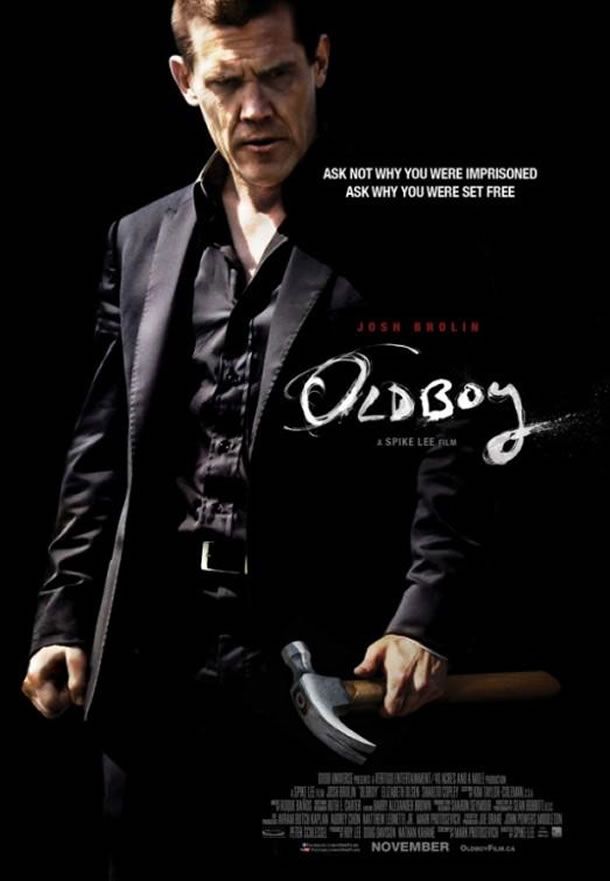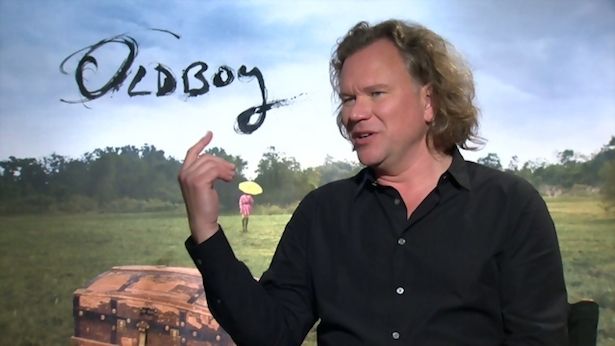Remakes are remarkably tricky business, but Mark Protosevich knows a few things about reimagining iconic source material: Before translating "Oldboy" for English-speaking audiences, he adapted Richard Matheson's "I Am Legend" for the screen, and updated the classic disaster "The Poseidon Adventure" into "Poseidon." Meanwhile, his first screenplay, "The Cell," helped introduce one of modern moviemaking's great visualists, Tarsem, and his story for Thor helped introduce the Marvel Cinematic Universe to its first bona fide God brought to Earth to learn humility.
In "Oldboy," however, Protosevich was tasked with taking not just hugely-acclaimed material and making it his own, but finding a way to make it digestible for mainstream audiences, who are generally not so interested in brutal violence and incest during a trip to the movies. The screenwriter sat down recently with Spinoff Online to talk about the challenges of making Chan-Wook Park's film into something different and original, while retaining the thematic depth and the emotional power that made it a true classic.
CBR News: Mark, in the process of taking this iconic film and translating it into English, what was the most important material to preserve, and what did you consider most ripe for reimagining?
I can just start out by saying I love the original film. I have a passionate respect for it, and I've seen it many, many times, especially in preparation for writing this version. I think it's a very unique work of art, and I don't think there's any way to sort of recreate or copy the unique feel stylistically that film has in sort of the unusual moments. So what I concentrated on specifically, what I felt connected to, was the story of this guy and what happens to him as a result of the incarceration, and then the challenge to him -- just sort of transformative effect that would have on a human being to go through that imprisonment, then be released and essentially presented with this challenge. So for me it was really a lot about that character, and the themes. In the original, there are ideas about revenge and about redemption, and those were the things I connected to the most thematically. That was the big driving force, incorporating those two themes through this character and the transformation he goes through -- and ultimately, sort of the idea of ultimately taking responsibility for everything you've done in your life.
Certainly there were scenes that we felt we wanted to keep, but some we didn't use, iconic things from the original, because it is a very eastern or Asian film, the whole sort of cultural philosophy of the [original] movie. So one of my goals was to make it more of a Western story, in sort of both senses of the word, really. Culturally, it would feel a little more akin to the west, and I suppose also there are some in terms of genre elements, Western elements to it, of revenge, having a challenge presented to you, confronting your persecutor, that type of thing.
How important was the casting of the character that Josh Brolin plays? In the original film, the main character is much more feeble and average, and from the beginning of this film, Joe Doucette seems much more formidable -- clearly more athletic and popular than Chan-Wook Park's protagonist ever was, even if he's now overweight.
I'm actually very delighted that you're saying all of that, because in my mind, you always have a lot more back story or history of a character that you create than ever gets seen in the movie. In this movie, it's a type of character that I've seen a lot and I'm fascinated by, and that's sort of the athlete who never made it. So few high school athletes or college athletes actually get to play in the major leagues or the NFL, pro ball, and what happens to someone who was this popular figure, this athletic figure, and then they end up working at a crappy ad agency? I think that there's an inherent disappointment that they're dealing with, and in this case, it's through alcohol, womanizing -- he's on a real downward spiral at the beginning of the movie. That kind of character fascinated me -- how does someone like that become something else, become something admirable? In my mind he was sort of on the rise, or was this very popular kid, and then life happened, and he didn't succeed at what he wanted to succeed at, and was leading this really sort of dull, uneventful life that he's miserable in.
One of the ideas that I wanted to play with was that the incarceration, in certain ways, is actually a positive for him, because it forces him into himself, and it forces him to confront all of his failures and all of the things he's been neglecting -- his daughter, and himself. And then [going], "I'm going to use this time to become something better." Also, there's an aspect of him that he's actually kind of mentally unstable by the time he's [released], which is very normal for anybody who's been in solitary confinement. It's very difficult to make that transition. I researched as much as I could in that and what happens to people when they don't have any physical contact with people, what it does to their psyche, and so in a way he's become this almost like uber version of himself, in terms of physically and mental focus -- but he's also still incredibly vulnerable.
REVIEW: Lee & Brolin's "Oldboy" Has No Teeth
Conversely, how did you envision Sharlto Copley's character? Most of the movie is rendered fairly realistically, but that character has a different level of theatricality, it seems.
That's a lot of what Sharlto brought to the part. The character is written as very cold, methodical, almost an extreme corporate businessman, so that the theatricality of the character is now has a lot to do with how Sharlto saw the part and elements he brought to it. That's him taking a character on the page and bringing another level to it.
What do you think that choice brings to the film in juxtaposition with the rest of its tone?
I guess it's sort of like you're eating a meal and then all of a sudden you get this real unexpected flavor to it, and that's either going to be this wonderful surprise or it's going to be, "What is this element doing here?" But I think it sort of puts a different spin on the story -- it adds this other element to it that I could even say I never saw coming, and it's kind of fascinating.
How delicately did you have to handle some of the more controversial plot details from the original film that American or English-speaking audiences might have more problems with? Did anyone have trepidations about how best to translate those choices?
One thing that everybody involved felt from the very beginning is "we have to go for it," otherwise it would be a copout -- we would be making it more palatable and it would be sanitizing it to a degree. Crazily, or thankfully, nobody wanted to do that. We really felt like "let's go for it," and in some ways, "let's up the ante." Because the revelation of the villain's family and what happened there is different than in the original, partly because I wanted to keep a father-child parallel going in it. But everybody [said] "let's go the dark route. Let's grab it by the throat and do it," which you don't get a lot of opportunities to do in this business. There were versions of "I Am Legend," especially the third act, that were much darker and more troubling than the final version of the film, but I don't know if that movie ever would have gotten made because of concerns by the studio and because of the cost. But in this case, it was of a certain budget and Good Universe was willing to take the risk.
Ultimately, how difficult is it for you to find these kinds of projects that you feel fall into your wheelhouse? You excel at combining these sorts of themes of isolate humanity with larger conceits.
Well, I think there's something appealing on an almost mythic or core human level about stories about individuals who are going through extreme circumstances. I find those stories fascinating, and luckily, there happen to be genre stories that incorporate that kind of theme. I find that if you can boil down a theme or story to that idea of an individual going through an extreme circumstance and the transformation that it has on them physically and psychologically and emotionally, that's an interesting story to me. I just find that compelling. Luckily in this case, I had the support of people saying, "Let's not be afraid." Because I think sometimes so many decisions are based, especially in Hollywood, in fear -- will the audience find this too upsetting? Will they find this interesting? Can we risk that? And so you oftentimes feel that anything that's a little too controversial or a little too disturbing or whatever gets scaled back. Actually, I think people are more open to being shaken up than people think, and [that] people need to be disturbed every once in a while -- so it shakes things up! [Laughs] It makes life a little more interesting. But luckily, I'm working on a few things now, or have things possibly in the future that deal with similar themes, so people are still interested in those stories. So, I'm lucky in that way, I guess!
"Oldboy" is now in theaters.



